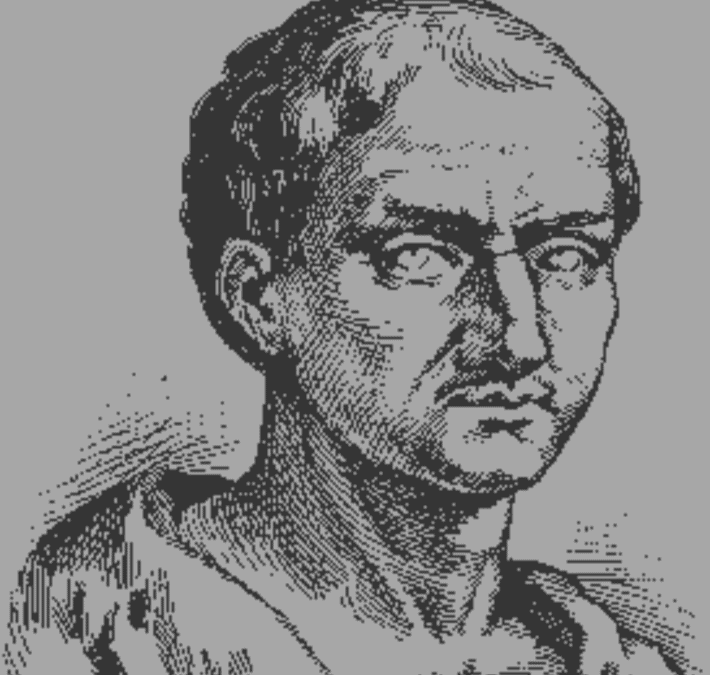Think I’m on safe ground when I say à Those listening to this are mostly likely students of history. Your knowledge of the past is probably more comprehensive than the average person. And of course, the range of knowledge among subscribers to CS spans the gamut from extensive to, well, not so much. Yet still, more than the average.
If asked to make a list of the main thinkers of the past; philosophers, theologians, and such like, of Western tradition, we’d get the usual. Socrates, Plato, Aristotle. Seneca, Cicero, Virgil. Clement, Origen, Augustine, Aquinas.
A name far less likely to make that list is the subject of this episode. Though he’s not oft mentioned in modern treatments of church and philosophical history, his work was a major contributor to medieval thought, which was the seedbed form which the modern world rose.
His full name was Anicius Manlius Torquatus Severinus. But he’s known to us simply as Boethius.
Born to a Roman senatorial family sometime between 475 & 80 in Italy, Boethius was left an orphan at an early age. He was adopted by another patrician, Memmius Symmachus, who instilled in the young man a love of literature and philosophy.
Symmachus made sure Boethius learned the vanishing skill of literacy in Greek. With the split between the Eastern & Western Roman Empires now settled, and the Fall of the Western Empire to the Goths, it seems Greek, primary language of the East, fell to disuse in favor of Latin. In the West, Greek became increasingly the language of scholars and those suspected of lingering loyalty to the East.
Nevertheless, Boethius’ familiarity with the classics commended him to the new rulers of the West – the Ostrogoths. Their king, Theodoric the Great, appointed the 35 year old Boethius as consul. While the office of consul was technically linked to the ancient Roman Republican Consul, by the 6th C, it was an office far more of image than substance. Still an important position politically, but wielding none of the authority it once had. By Boethius’ time, that is the early 6th C, being a senator meant little more than, “This is someone to keep your eye on as a potential future leader.” Being made a consul was like making the finals in the last round of the playoffs. But with an emperor seated on the throne, all rule and authority was concentrated in the royal court. A 5th & 6th C Roman Consul was more a political figurehead; a polite fiction; a nod to the glory of ancient Rome and her amazing feat of world conquest. From Augustus on, the Roman Senate and her consuls steadily lost place to the new imperial bureaucracy. After Augustus, who moved swiftly to relocate and consolidate all power within his executive office, Roman emperors turned to the Prefect of the Praetorian Guard as the new go to guy in executing Imperial policy. By the time of Boethius, that office had evolved into what was called the Magister Officiorum; head of all government and judicial services.
When Boethius’s term as consul was up, his two sons were appointed co-consuls in his place, one for the West, the other for the East. He was then promoted into the role of Magister Officiorum – the highest administrative position in King Theodoric’s court.
And that’s where the fun begins. à Well, it wasn’t so fun for Boethius. I probably ought to say; that’s where the political shenanigans and devious machinations began. For it was there, serving Theodoric, that Boethius ran afoul of the ambitions of powerful men.
They used Boethius’ faith to bring him down.
And here we’re back to the old Arian-Nicaean Controversy. You see, while Arianism had been debunked and expelled from the Western Church long before all this, it found a home among the Goths of the East; the Ostrogoths, who now ruled what was left of the Western Roman Empire. King Theodoric was an Arian, as were his Ostrogoth pals, many of whom were jealous that an outsider like Boethius had the highest post they could aspire to. Oh, and don’t forget that Boethius is fluent in Greek, the language they speak over in the Eastern Empire. Whose Emperor, Justinian I was openly known to aspire to reclaim Italy from Theodoric. Oh, and to add fuel to the fires of controversy & suspicion, those Easterners are also Orthodox, Nicaean Christians, people who’ve systematically wiped out Arians.
Boethius’ was doing a stellar job as Magister Officiorum, so they knew they couldn’t attack him directly. They went instead after his less well-connected friends, accusing them of conspiring with Justinian in his designs on Italy. They knew Boethius would come to their defense, and that would be enough to cast a pall over his imperial favor. The ruse worked, and Boethius was arrested, hauled off to an estate in Pavia, where he spent a year in confinement, then quietly executed when the news cycle shifted to other more pressing matters. Ha! Today, the news cycle is down to about 5 days. Back then, it was several months.
Now, you may be wondering, what does Boethius have to do with CHURCH history? I’m so glad you asked.
Boethius’ main contribution to history in general and to Church history in particular lies in his impact on the relationship between theology and philosophy. He’s regarded by many as the last of the ancient philosophers.
Boethius adored the ancient Greeks. It was his life’s ambition, to translate the works of Plato and Aristotle into Latin. He died before he was able, but he made a good start. His singular contribution to history is his serving as a bridge between the classical and medieval ages for understanding Aristotelean thought, especially as it regards Aristotle’s work in LOGIC. Boethius recast Aristotle’s principles in terms that Medieval Europeans could grasp. His work then was foundational to many other theologians and philosophers for hundreds of years. One can argue that without Boethius, Roman Scholasticism, might not have happened, or at least it would have adopted a very different form. Boethius provided much of the vocabulary of medieval theology and philosophy. He’s sometimes called “the first scholastic” because in his work titled Opuscula Sacra, written to defend orthodox theology, he applied Aristotelian logic, seeking to harmonize faith & reason – the great task of later Scholastics.
But it was during his year of imprisonment in Pavia, as he awaited execution that Boethius wrote his most well-known volume, The Consolation of Philosophy, regarded as the single most influential work on Medieval and early Renaissance Christianity, & the last great Western work of the Classical Period.
Written in 523, The Consolation of Philosophy presents a conversation between himself and Lady Philosophy, who’s come to console him. It’s essentially a theodicy; an examination of the age-old dilemma addressing the challenge posed by the dual proposition of the existence of evil & God’s omnipotence and love. A theodicy seeks to answer the question: If the God of the Bible is real, why is there evil in the world; a potent question for a man like Boethius, an innocent man awaiting execution by the wicked.
During Lady Philosophy’s discourse, subjects like predestination and free will are examined. The Consolation isn’t an overtly Gospel centered work. Jesus isn’t even mentioned. A rather generic God is assumed; a deity who certainly aligns loosely with The God of Scripture; but a distinctive Christian Trinitarian God isn’t defined. For this reason, some historian claim Boethius wasn’t a Christian. But that assessment simply doesn’t square with the rest of his life, his other writings, or why he was accused of treason. His enemies went after him precisely because his orthodoxy raised Arian suspicion.
So, what are we to make of the Consolation’s lack of Gospel content? Surely the answer is found in Boethius’ intended audience. He wasn’t writing to or for Christians, showing them how to link faith and reason. He wrote to convince pagans that real philosophy, the kind that led to a better life, the BEST life, doesn’t flow in tandem with paganism. The best life is a moral life, where justice and moderation are virtues. It was no doubt Boethius’ hope, once pagans realized pagan religion hindered a better life, they’d investigate Christianity, because at that time in Europe those were the only two options, the only available worldviews: Christianity & Paganism. Take down paganism, and people would move to the only thing left – The Gospel.

